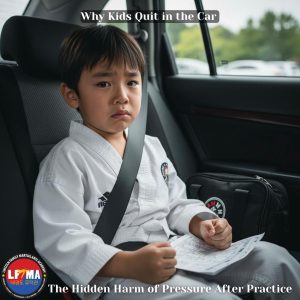Why Kids Quit in the Car: The Hidden Harm of Pressure After Practice
Why Kids Quit in the Car: The Hidden Harm of Pressure After Practice
What happens in the car after a lesson, practice, or game might seem small to an adult, but to a child, it can shape how they feel about training altogether.
This moment is when:
• Their body is still coming down from class energy
• Their brain is sorting through everything that just happened
• Their confidence is being strengthened or shaken
Many parents, with the best intentions, accidentally turn this car ride into a breakdown of what their child did wrong, which often sounds like:
- “You weren’t listening today.”
• “If you don’t put more effort in, I might pull you out.”
• “That wasn’t your best. You should be doing better.”
• “Next time you need to try harder.”
What happens next? Kids begin to associate an activity they used to enjoy with pressure, anxiety, and the fear of disappointing the person they want to impress most.
Why This Backfires: What the Brain Experiences
The developing brain reacts strongly to emotional tone and feedback. Here is what happens during those tough car rides:
Cortisol Spike
When a child feels criticized or pressured, cortisol rises. This blocks healthy learning, shuts down memory processing, and replaces growth with stress.
Amygdala Reaction
The emotional center of the brain becomes highly reactive. Fight, flight, or freeze takes over, which stops the logical and confident part of the brain from working at its best.
Fear-Based Motivation Fades
Children may follow directions in the short term, but over time confidence drops, creativity fades, and the joy of the activity disappears.
This is often how kids slowly lose interest in training or sports they once loved.
What Kids Need Instead: Connection-Driven Motivation
You can transform the entire car ride by strengthening these positive brain chemicals. Here are a few simple ways to help:
- Dopamine
Encourages focus, motivation, and small-goal growth.
Try this:
• Celebrate progress.
• Set positive anticipation for next time.
• “I noticed you really focused during that drill. That was awesome to see.”
• “I can’t wait to see what you learn next.”
- Oxytocin:
Encourages trust, connection, and emotional safety.
Try this:
• A hug or high-five.
• Ask supportive questions.
• Validate emotions genuinely.
• “How did class feel for you today?”
• “It is okay to feel disappointed. That means you cared.”
- Serotonin:
Encourages emotional balance and confidence.
Try this:
• Acknowledge internal wins.
• Offer simple choices to empower them.
• “You stayed patient and it showed. I’m proud of that.”
- Endorphins:
Encourage joy, resilience, and stress relief.
Try this:
• Share a laugh or play upbeat music to keep the ride home light.
• Celebrate simply showing up.
• “You showed up and gave your best today. That always matters.”
Car Ride Alternatives to the Lecture
Instead of reviewing mistakes, try:
- “What was your favorite moment today?”
• “Did you learn something new?”
• “What would you like to try again next time?”
Or keep it simple with:
• “I loved watching you today.”
Adding a post-class tradition also helps. A small snack stop, a fun playlist, or a quick game of high, low, funny can completely shift the tone of the ride home.
The Long-Term Impact of Positive Post-Practice Moments
When kids feel supported after class, they tend to:
• Stay committed to their activity longer
• Develop intrinsic motivation
• Build resilience through challenges
• Create positive associations with effort
Your words become part of your child’s internal dialogue. Let that voice be encouraging, steady, and uplifting.

About Lincoln Family Martial Arts Academy
Lincoln Family Martial Arts Academy has been proudly serving families in the Lincoln community for over a decade. What originally began as a family training together has become a second home for students of all ages.
Founded by Master Wong, a fifth degree black belt and co-founder of the academy, our programs blend tradition, science, and heart. We welcome students as young as 18 months and have trained adults well into their 80s.
Our academy teaches a well-rounded blend of traditional martial arts that help students build character, confidence, leadership, and life skills that stay with them far beyond the mat.
We offer age-specific programs such as Early Tigers for ages 3 to 4, Basic Tigers for ages 5 to 6, and specialized classes for youth, teens, and adults. Every lesson is built on the internationally acclaimed SKILLZ child development curriculum, helping each student grow physically, intellectually, emotionally, and socially.
To learn more or to start two free weeks of training, visit www.LincolnFamilyTaekwondo.com or call (916) 645-7856
Lincoln Family Martial Arts Academy
615 5th Street, Lincoln, CA 95648